
Related
President Biden reportedly warned Chinese President Xi Jinping via video call Friday that China would face “consequences” if it provided material support to Russia amid the war in Ukraine. The call was part of U.S. efforts to minimize an emerging Sino-Russian alliance, which threatens U.S. influence over the Eurasian landmass, says Alfred McCoy, professor of history at the University of Wisconsin-Madison. As U.S. global power declines, China and Russia “are going to emerge as the new centers of global power on the planet,” he adds.
Transcript
AMY GOODMAN: This is Democracy Now!, democracynow.org, The War and Peace Report. I’m Amy Goodman.
President Biden and Chinese President Xi Jinping spoke for nearly two hours Friday, with much of the discussion focused on Russia’s invasion of Ukraine. Biden reportedly warned Xi that China will face “consequences” if it provides material support to Russia. It was the first call between the two leaders of the world’s two largest economies in four months.
In February, Russian President Vladimir Putin traveled to Beijing for talks with Xi ahead of the invasion. Earlier this month, China joined India, Iran, Pakistan and 32 other nations from the Global South in abstaining from a United Nations vote condemning Russia’s war in Ukraine. On Saturday, China’s vice foreign minister criticized NATO as a, quote, “Cold War vestige” and criticized Western sanctions on Russia, saying globalization is being used as a weapon.
To look more at China’s evolving relations with both Russia and the United States, we’re joined by Alfred McCoy, professor of history at University of Wisconsin-Madison, author of numerous books, most recently, To Govern the Globe: World Orders and Catastrophic Change. His recent article for The Nation is headlined “Russia and China, Together at Last.”
Welcome back to Democracy Now!, Professor McCoy.
ALFRED McCOY: Thank you for having me.
AMY GOODMAN: Why don’t you start off by responding to the talk that President Biden and Xi Jinping had on Friday, what we learned of what they said?
ALFRED McCOY: Apparently, what President Biden was hoping to accomplish in his phone conversation with Xi Jinping was to draw on their successful video meeting last November and kind of encourage or even pressure President Xi to back away from China’s strong support for Russia’s invasion of Ukraine. And that did not happen. President Xi’s quote, the most memorable, the most important quote, was he wanted the United States to “untie the knot” of Ukrainian and Russian security. And that was a kind oblique reference to the idea that the United States and NATO are responsible for Russia’s invasion of Ukraine by expanding NATO right up to the borders of Russia and threatening Russian security. And that’s also a reference to the historic meeting between Putin and Xi Jinping on February 4th of this year, when the two met during the Winter Olympics and they issued an historic 5,300-word declaration that laid claim to establishing a kind of new global order to attacking U.S. global hegemony and to build upon their strong bilateral alliance, their very close economic integration in the field of energy, and to simultaneously block NATO from threatening Russia and block the United States from supporting Taiwan against China’s legitimate claims to Taiwan. And so, in effect, what that meeting failed to accomplish was it simply failed to break this emerging alliance between China and Russia, which is literally shaking the current world order.
AMY GOODMAN: I wanted to turn to Qin Gang, the Chinese ambassador to the United States, appearing on CBS’s Face the Nation Sunday. He was questioned by Margaret Brennan.
MARGARET BRENNAN: Has Xi Jinping, your president, told Vladimir Putin to stop the invasion? Do you condemn it?
QIN GANG: Actually, on the second day of Russia’s military operation, President Xi Jinping did talk to President Putin —
MARGARET BRENNAN: Was that their last phone call?
QIN GANG: — asking President Putin to think about resuming peace talks with Ukraine. And President Putin listened to it, and we have seen four rounds of peace talks have happened. Let me continue. China’s trusted relations with Russia is not a liability. Actually, it’s an asset in the international efforts to solve the crisis in a peaceful way. And China is part of the solution. It’s not part of the problem.
AMY GOODMAN: Professor McCoy, can you respond to the significance of what the Chinese ambassador to the United States said?
ALFRED McCOY: Of course. He is again kind of affirming what President Xi said in that meeting last Friday with President Biden — in essence, that China is not going to rupture its relations with Russia, it’s not going to apply pressure on Russia, it’s not going to blame Russia, it’s not going to call the Russian invasion of Ukraine an invasion, and it is going to affirm that Russia has legitimate security concerns in Ukraine that must be met, and that if China is going to do anything, it is going to apply its considerable international power and prestige to support Russia in establishing its security in Eastern Europe.
I think what’s going on more broadly is that we’re saying a sense of extraordinary confidence from Moscow and Beijing that, literally, history — and, more importantly, geopolitics — is on their side. They believe that their alliance gives them such dominance, such power on the massive Eurasian landmass, that they can prevail, that they can not only dominate the landmass, they can dominate international politics. In essence, they are pursuing a geopolitical strategy to break U.S. control over the Eurasian landmass, and thereby break U.S. global power. They think that they are witnessing the birth, the historic birth, of a new world order in which the great global hegemon, the United States, which has dominated the world for the past 70 years — in which its global power is broken, and its dominance over Eurasia, something the United States has maintained since the start of the Cold War in the early 1950s, but that is coming also to an end.
AMY GOODMAN: This is the White House Press Secretary Jen Psaki talking about Biden’s meeting with Xi Jinping on video phone call.
PRESS SECRETARY JEN PSAKI: The movement of China to align with Russia or to — yeah, the movement of them to align with Russia or their proximity of moving closer together is certainly of great concern to us, as we have expressed, and we are not the only country that has expressed that concern, including many other members of the G7 have expressed exactly that concern. So this is part of the discussion, has been an ongoing part of the discussion, expect it certainly would be when the president goes to Europe next week. But we’re not in a place at this point to outline the specifics. We’re still discussing.
AMY GOODMAN: So, if you can talk more about, Professor McCoy, what Biden threatened, if it has an effect? You know, he is going to Europe this week. He’s speaking with a lot of European nations today, then meeting in Brussels with other NATO members, then going to Poland to hold bilateral talks Friday and Saturday. What this means for Russia, and then for Russia and China?
ALFRED McCOY: The United States is concerned, I think, in two areas — one, that China will provide weaponry and financial support, and, in fact, China can break the financial embargo that the United States is trying to impose upon Russia in order to restrain them in their invasion of Ukraine. And so, what Washington is monitoring is flows of weapon and flows of financial support from China to Russia. That’s what the United States is trying to restrain. And that, the weapons may have a short-term impact; the financial flows, a medium-term impact. That’s the U.S. concern.
But I think we need to sort of analyze the situation in dual tracks — one, focus on the diplomacy, the military activity in Ukraine, the course of the war on the battlefield. OK? And that may or may not go Putin’s way. But underlying that, there is this extraordinary confidence in Moscow and Beijing that the geopolitics of Eurasia are on their side, that because of their alliance and their dominant position in this great landmass that comprises 70% of the world’s population and productivity, that it almost inevitably — that they are going to emerge as the new centers of global power on the planet. And that, I think, is underlying their boldness and their resistance to Washington’s pressure.
So, we can — from their perspective, we can provide weapons, we can mount financial pressure, we can even impact the situation on the battlefield by providing anti-tank missiles and handheld weapons that can bring — Stinger missiles that can bring down Russian helicopters and aircraft. We can do all, that but that is not material. That’s not what’s going to matter. They believe, because of the theory of geopolitics, that being the dominant powers in this great Eurasian landmass, that they can slowly break the controls that the United States has imposed over Eurasia since the start of the Cold War, and they can break U.S. global power, and they, together, can construct a new global order.
Every global hegemon — and that’s the word that Beijing and Moscow use — every global hegemon for the last 500 years, from the Portuguese to the Spanish, the Dutch, the British, the United States, and now the Chinese, have done one thing in common: They have all dominated Eurasia. Their rise to global power, including the U.S. rise to global power after World War II, was accompanied by dominance over Eurasia. And decline of all of these global powers, including the United States, has been marked by their declining control over Eurasia.
And together, Beijing and Moscow are pursuing a strategy that I call, you know, push, push, punch. So, they are pushing at these great chains of geopolitical control that the United States has ringed around Eurasia since the Cold War — naval fleets, air bases, mutual defense pacts — they’re pushing slowly at the east and west ends of Eurasia, hoping to strain and break those chains of control that the United States has imposed over Eurasia, until, in the succession of these punches, those chains of control snap, U.S. dominance over Eurasia comes to an end, and, correspondingly, in the theory of geopolitics, U.S. global power also declines.
AMY GOODMAN: So, Professor McCoy, one of the key reasons binding Russia to China, in addition to what you’ve been talking about, is that Russia is a major energy exporter. China is one of the world’s leading energy importers. Put that together with, The Wall Street Journal reporting last week, Saudi Arabia is in active talks with Beijing to price some of its oil sales to China in yuan, a move that would dent the U.S. dollar’s dominance of the global petroleum market. China buys more than a quarter of the oil that Saudi Arabia exports. If priced in yuan, those sales would boost the standing of China’s currency. Can you talk about the significance of both the currency and energy politics?
ALFRED McCOY: Sure. One of the foundations of U.S. global powers, right since the end of World War II, has been that the dollar has been the functional global reserve currency. That was set at the Bretton Woods Conference in 1944. And in 1971, when President Nixon ended the automatic convertibility of dollars to gold, Saudi Arabia announced that they would keep conducting their petroleum transactions in dollars. And since oil is the most negotiated of all international commodities, if the world is doing its oil business in dollars, that means the dollar has that continuing support as global reserve currency.
Since 2015, the Chinese currency has become a part of the international basket of currencies recognized by the International Monetary Fund. And as China’s dominance over the global economy grows and it becomes the world’s largest economy, the Chinese currency’s role in that international economy is going to increase. And once the dollar declines — that is the most negotiable, the most visible part of U.S. global dominance — that global dominance will follow the decline of the dollar downward.
AMY GOODMAN: How do you see all of this playing out, Professor McCoy?
ALFRED McCOY: Short term, I think that what we’re looking at is a kind of a parallel of what happened with the last time China and Russia were aligned. In the early 1950s, Mao Zedong went to Moscow. He was a supplicant. He formed an alliance with Joseph Stalin. And Joseph Stalin cashed in that alliance very quickly by using China to enter the Korean War. China fought in Korea for three years. It cost them about 40% of China’s budget, 200,000 dead Chinese soldiers. What we’re looking at is kind of a reprise of that. You know, Putin comes to Beijing in February in the Winter Olympics. He’s now the supplicant. He needs China’s diplomatic and economic support for his Ukraine invasion. And so, at the moment of this very strong alliance again, this time Putin attacks. He’s sacrificing his budget, his soldiers, in this strategy of pushing and pushing and breaking the U.S. dominance over Eurasia.
I see, long term, the growing power of China over the Eurasian continent. Their Belt and Road Initiative, this trillion-dollar development program that now incorporates around 70 nations in Eurasia and Africa, laying down infrastructure — pipelines, railroads and roads — across the whole Eurasian landmass, if this development project succeeds — and it’s 10 times the size of the Marshall Plan that the United States used to rebuild Europe after World War II; it’s the biggest development scheme in human history — if this scheme works in laying down infrastructure of rails, pipelines and roads across the Eurasian landmass, and that draws the commerce of Eurasia, home to 70% of the world’s population, towards Beijing, then, almost as if by natural law, power and prestige and global leadership will flow towards Beijing.
And so, what we’re witnessing is the violent eruptions of a great tectonic shift in global power. As U.S. global power declines, China ascends. Power shifts from the West — Europe and the United States — towards Asia. And what we’re witnessing then, an historic change that is for the — I’d say, by 2030, by the end of this decade, it will become clear that U.S. global power has eclipsed, that power has shifted to Beijing on the Eurasian landmass, and they are the new global hegemon, constructing a new kind of world order, far less concerned with human rights, far less concerned with law, a kind of transactional world order of mutual convenience.
AMY GOODMAN: We’re going to leave it there, but it’s certainly a discussion that we will continue. Alfred McCoy, professor of history at the University of Wisconsin-Madison, author of numerous books, most recently, To Govern the Globe: World Orders and Catastrophic Change. We’ll link to your piece in The Nation, “Russia and China, Together at Last.”
Coming up, we go to Western Sahara, Africa’s last colony, for an exclusive interview with a leading Sahrawi human rights defender, Sultana Khaya, who’s been under de facto house arrest for almost 500 days. A group of U.S. activists have just broken the siege on her home. Stay with us.

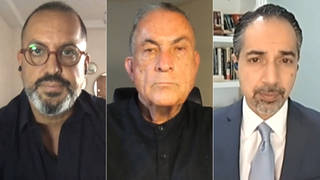
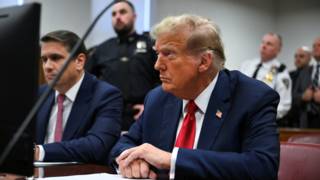
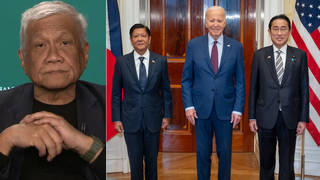
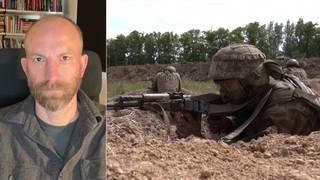





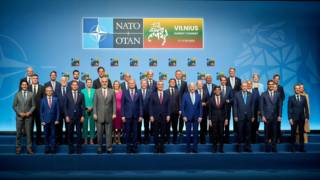
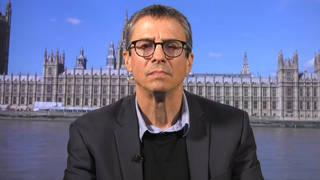
Media Options